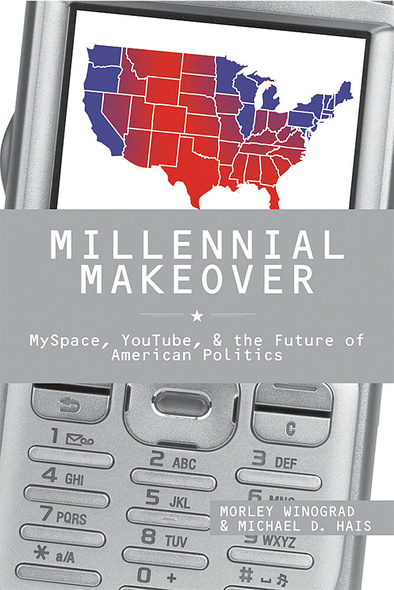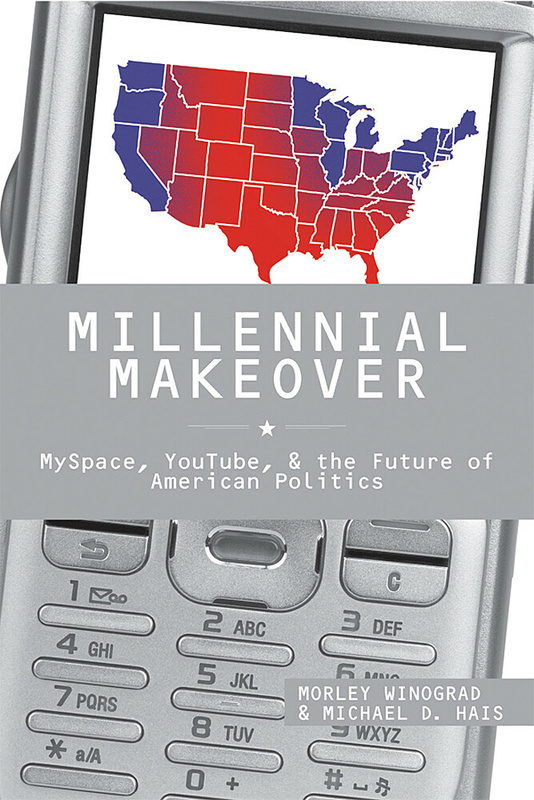Millennial Makeover
MySpace, YouTube, and the Future of American Politics
A 2008 New York Times Notable Book of the Year
It happens in America every four decades and it is about to happen again. America’s demand for change in the 2008 election will cause another of our country’s periodic political makeovers. This realignment, like all others before it, will result from the coming of age of a new generation of young Americans—the Millennial Generation—and the full emergence of the Internet-based communications technology that this generation uses so well. Beginning in 2008, almost everything about American politics and government will transform—voting patterns, the fortunes of the two political parties, the issues that engage the nation, and our government and its public policy.
Building on the seminal work of previous generational theorists,Morley Winograd and Michael D. Hais demonstrate and describe, for the first time, the two types of realignments—“idealist” and “civic”—that have alternated with one another throughout the nation’s history. Based on these patterns, Winograd and Hais predict that the next realignment will be very different from the last one that occurred in 1968. “Idealist” realignments, like the one put into motion forty years ago by the Baby Boomer Generation, produce, among other things, a political emphasis on divisive social issues and governmental gridlock. “Civic” realignments, like the one that is coming, and the one produced by the famous GI or “Greatest” Generation in the 1930s, by contrast, tend to produce societal unity, increased attention to and successful resolution of basic economic and foreign policy issues, and institution-building.
The authors detail the contours and causes of the country’s five previous political makeovers, before delving deeply into the generational and technological trends that will shape the next. The book’s final section forecasts the impact of the Millennial Makeover on the elections, issues, and public policies that will characterize America’s politics in the decades ahead.
For additional information go to:
Millennial Makeover website.
Here is an insightful—and provocative—look at the future of American politics. It will delight some people and startle others—but it will leave no one unmoved.
With sound analysis, the authors persuasively contend that the prospect of Millennials going viral (using their numbers, values, commitments, and sociopolitical networking to effect change and demand new political leadership) must not be underestimated. If their conclusions are accurate, 2008 will be remembered as a turning point in American politics. Highly recommended.
I think they're on to something important. While I don't agree with every point in their analysis, I think that Millennial Makeover will be read with pleasure by Democrats and should be read with careful, worried attention by Republicans.
According to the authors of Millennial Makeover: MySpace, YouTube, and the Future of American Politics, change is indeed on its way, and the magnitude of that change will be monumental—a tectonic realignment of the sort that occurs about every four decades, leading to a fundamental shift in policy priorities and voter coalitions.
Thanks to sophisticated survey techniques and constant polling, demographers predicted the Millennials' pivotal role in this year's presidential election. Two analysts, Morley Winograd and Michael D. Hais, even prophesied the outcome of the election 14 months before.
We found similar generational patterns to Winograd and Hais in our recent paper entitled 'The Millennial Pendulum.' Our paper added one small methodological refinement--we tracked political opinions over time for several cohorts--but didn't provide much of a literature review. Any bibliography should start with Winograd and Hais.
Here is an insightful—and provocative—look at the future of American politics. It will delight some people and startle others—but it will leave no one unmoved.
With sound analysis, the authors persuasively contend that the prospect of Millennials going viral (using their numbers, values, commitments, and sociopolitical networking to effect change and demand new political leadership) must not be underestimated. If their conclusions are accurate, 2008 will be remembered as a turning point in American politics. Highly recommended.
I think they're on to something important. While I don't agree with every point in their analysis, I think that Millennial Makeover will be read with pleasure by Democrats and should be read with careful, worried attention by Republicans.
According to the authors of Millennial Makeover: MySpace, YouTube, and the Future of American Politics, change is indeed on its way, and the magnitude of that change will be monumental—a tectonic realignment of the sort that occurs about every four decades, leading to a fundamental shift in policy priorities and voter coalitions.
Thanks to sophisticated survey techniques and constant polling, demographers predicted the Millennials' pivotal role in this year's presidential election. Two analysts, Morley Winograd and Michael D. Hais, even prophesied the outcome of the election 14 months before.
We found similar generational patterns to Winograd and Hais in our recent paper entitled 'The Millennial Pendulum.' Our paper added one small methodological refinement--we tracked political opinions over time for several cohorts--but didn't provide much of a literature review. Any bibliography should start with Winograd and Hais.
MICHAEL D. HAIS is retired as the vice president of entertainment research at the communications research firm, Frank N. Magid Associates.
Acknowledgments
Introduction
Part I. Cycles of American Politics
1. The rise and fall of political parties in America
2. Idealist and civic eras in American history
3. Politicians love to talk
4. Meet the millennials
5. Millennials will spearhead the coming political realignment
Part II. Transition to a New Era
6. The realignment begins
7. Winning without the mother's milk of politics
8. The technology tsunami
9. Social networks will change America's political map
10. Winning the technology arms race
Part III. The New American Political Landscape
11. Triggering a new America
12. Who will party with whom?
13. Who will lead the realignment?
14. Rebuilding America's civic infrastructure
15. Public policy in a millennial era
Afterword
References
Index






